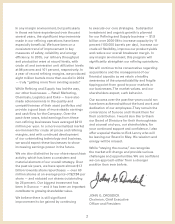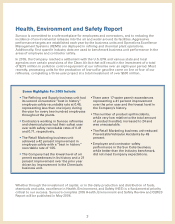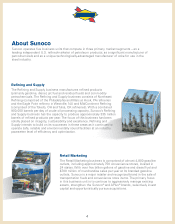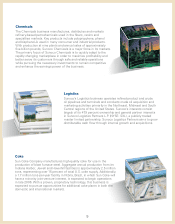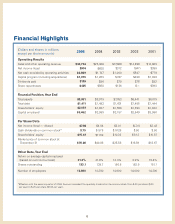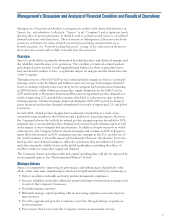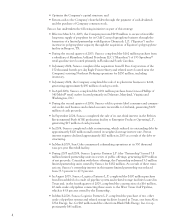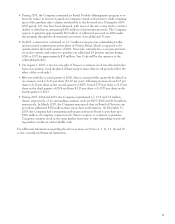Sunoco 2005 Annual Report Download - page 14
Download and view the complete annual report
Please find page 14 of the 2005 Sunoco annual report below. You can navigate through the pages in the report by either clicking on the pages listed below, or by using the keyword search tool below to find specific information within the annual report.
to the increase were higher production volumes ($15 million). Partially offsetting these
positive factors were higher expenses ($76 million), including fuel, depreciation and
employee-related charges and a higher effective income tax rate ($23 million).
Effective January 13, 2004, Sunoco completed the purchase of the 150 thousand
barrels-per-day Eagle Point refinery and related assets from El Paso Corporation for $250
million, including inventory. In connection with this transaction, Sunoco also assumed
certain environmental and other liabilities. The Eagle Point refinery is located in West-
ville, NJ, near the Company’s existing Northeast Refining operations. Management be-
lieves the acquisition of the Eagle Point refinery complements and enhances the
Company’s refining operations in the Northeast and enables the capture of significant syn-
ergies in Northeast Refining. The related assets acquired include certain pipeline and other
logistics assets associated with the refinery which Sunoco subsequently sold in March 2004
to Sunoco Logistics Partners L.P., the consolidated master limited partnership that is 47.9
percent owned by Sunoco. (See Note 2 to the consolidated financial statements.)
Retail Marketing
The Retail Marketing business sells gasoline and middle distillates at retail and operates
convenience stores in 24 states, primarily on the East Coast and in the Midwest region of
the United States.
2005 2004 2003
Income (millions of dollars) $30 $68 $91
Retail margin* (per barrel):
Gasoline $3.39 $4.13 $4.34
Middle distillates $4.49 $4.40 $4.73
Sales (thousands of barrels daily):
Gasoline 298.3 296.3 276.5
Middle distillates 45.3 42.7 40.3
343.6 339.0 316.8
Retail gasoline outlets 4,763 4,804 4,528
*Retail sales price less related wholesale price and terminalling and transportation costs per barrel. The retail sales price is the weighted-
average price received through the various branded marketing distribution channels.
Retail Marketing segment income decreased $38 million in 2005. Excluding income from
the Mobil®retail sites acquired from ConocoPhillips in April 2004, the decrease in results
was primarily due to lower average retail gasoline margins ($52 million) and lower gains
attributable to the Retail Portfolio Management program ($2 million), partially offset by
lower expenses ($22 million). Income from the Mobil®sites amounted to $10 and $15 mil-
lion for 2005 and 2004, respectively.
Retail Marketing segment income decreased $23 million in 2004. Excluding income from
the Mobil®acquired sites as well as from Speedway®sites acquired from Marathon in June
2003, the decrease in results was primarily due to a lower average retail gasoline margin
($27 million), which was down 0.5 cents per gallon, or 5 percent, versus 2003. Also con-
tributing to the decline were lower gasoline sales volumes ($4 million), lower distillate
margins ($3 million) and lower non-gasoline income ($9 million). Partially offsetting these
negative factors were the $15 million of income attributable to the Mobil®sites and a $6
million increase in income attributable to the Speedway®sites.
During the second quarter of 2004, Sunoco sold its private label consumer and commercial
credit card business and related accounts receivable to Citibank. In connection with this
divestment, Sunoco received $100 million in cash proceeds, recognized a $2 million
after-tax gain on the divestment and established a $2 million after-tax accrual for
employee terminations and other exit costs. In addition, the two companies signed a
seven-year agreement for Citibank to operate and service the Sunoco private label credit
card program.
12


